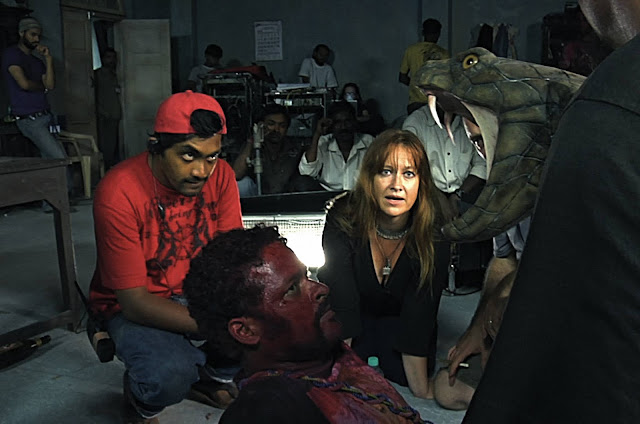Lynch is such an interesting individual. As an artist and storyteller, she is concerned with the darker side of human nature, her work is full of serial killers and psychologically scarred individuals. After working as a production assistant on her father David’s film Blue Velvet (1986), she authored The Secret Diary of Laura Palmer (1990) in her early twenties, before going on to write and direct her first feature film, Boxing Helena (1993), a deeply twisted and melodramatic contemporary fairy tale about obsession, voyeurism and psychosexual mind games. It was critically lambasted upon its much-anticipated release and Lynch had a daughter, retreated from Hollywood, and worked myriad jobs (including cleaning motels) before finally returning to filmmaking 15 years later with Surveillance (2008). A critical success (Lynch became the first woman to win the Best Director award at the New York City Horror Film Festival), Surveillance is dark and harrowing horror-thriller about serial killers, perception, and memory. Her next project was Hisss...
As the primary focus of Despite the Gods, Lynch is immensely likeable and relatable, and cares deeply about the production of Hisss, a tale of the Nagin (a snake goddess from Indian folklore). Lynch is incredibly candid and down to earth. We see her in quieter moments when she is stressed, overwhelmed and doubting herself, and the moments in which she calmly asserts her command of the production when producers and crew are talking over her and dismissing her authority as the director. She eventually earns their respect and trust and holds the entire production together through encouragement and determination. She goes above and beyond, rolling up her sleeves and getting involved in so many different aspects of the production: from make-up, to first aid, to health and safety (at one point a producer claims it doesn’t matter if the production doesn’t have insurance, because if someone dies onset, they’ll be reincarnated).
Vozniak’s approach invites us right into the eye of the storm, though it never feels too intrusive, perhaps because of Lynch’s congenial demeanour. She always seems to take everything in her stride, even when she believes she’s losing her grip. The story Vozniak tells is of a filmmaker overcoming tremendous personal and professional strife to hold together a production. It charts Lynch’s personal journey as she realises what is important to her. She ended up investing so much of herself in a production that was ultimately taken out of her hands, out of her creative control. This must have been devastating, especially as she reveals to Vozniak that, aside from the culture clashes and overbearing interfering execs, one of the main reasons she feels so overwhelmed by the production is because she still feels she needs to prove herself as a filmmaker. These moments reveal the hurt she barely recovered from after the vitriolic, and oftentimes way too personal criticism of Boxing Helena (which many voices have since claimed she received not just because of the film and its content, but because of who her father is and because she was a young woman). Silver clouds come in the form of changes in her personal life and the critical appraisal of her second film Surveillance, which was accepted at a prestigious film festival during the production of Hisss. This helps her keep perspective as the production of Hisss spirals further into chaos.
Hisss was only her third feature, and in attempting to make it, Lynch set herself ambitious goals as a filmmaker, an artist and a storyteller. While it was ultimately taken out of her control (she has since disowned the released version of the film which was edited and partially re-shot by the aforementioned interfering studio execs) it looked to be an intriguing celluloid-sibling to Boxing Helena, a subversive feminist statement about power and control, a far cry from the film the studio actually released. Despite the Gods unveils Jennifer Lynch as a highly resilient individual, someone who has had to prove herself, adapt and be resourceful. She is a filmmaker who may have her feet firmly on the ground, but she also has bold visions and is not afraid to take artistic risks to tell stories in her chosen medium. I for one always look forward to seeing her work.


